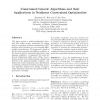Free Online Productivity Tools
i2Speak
i2Symbol
i2OCR
iTex2Img
iWeb2Print
iWeb2Shot
i2Type
iPdf2Split
iPdf2Merge
i2Bopomofo
i2Arabic
i2Style
i2Image
i2PDF
iLatex2Rtf
Sci2ools
115
click to vote
ICTAI
2000
IEEE
2000
IEEE
Constrained genetic algorithms and their applications in nonlinear constrained optimization
This paper presents a problem-independent framework that uni es various mechanisms for solving discrete constrained nonlinear programming (NLP) problems whose functions are not necessarily di erentiable and continuous. The framework is based on the rst-order necessary and su cient conditions in the theory of discrete constrained optimization using Lagrange multipliers. It implements the search for discrete-neighborhood saddle points (SPdn) by performing ascents in the original-variable subspace and descents in the Lagrange-multiplier subspace. Our study on the various mechanisms shows that CSAGA, a combined constrained simulated annealing and genetic algorithm, performs well. Finally, we apply iterative deepening to determine the optimal number of generations in CSAGA.
Artificial Intelligence | Constrained Nonlinear Programming | Discrete Constrained Optimization | ICTAI 2000 | Various Mechanisms |
Related Content
| Added | 31 Jul 2010 |
| Updated | 31 Jul 2010 |
| Type | Conference |
| Year | 2000 |
| Where | ICTAI |
| Authors | Benjamin W. Wah, Yixin Chen |
Comments (0)

